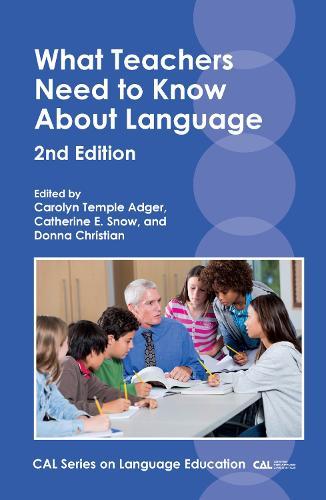Overview
Rising enrollments of students for whom English is not a first language mean that every teacher - whether teaching kindergarten or high school algebra - is a language teacher. This book explains what teachers need to know about language in order to be more effective in the classroom, and it shows how teacher education might help them gain that knowledge. It focuses especially on features of academic English and gives examples of the many aspects of teaching and learning to which language is key. This second edition reflects the now greatly expanded knowledge base about academic language and classroom discourse, and highlights the pivotal role that language plays in learning and schooling. The volume will be of interest to teachers, teacher educators, professional development specialists, administrators, and all those interested in helping to ensure student success in the classroom and beyond.
Full Product Details
Author: Carolyn Temple Adger , Catherine E. Snow , Donna Christian
Publisher: Multilingual Matters
Imprint: Multilingual Matters
Edition: 2nd edition
Dimensions:
Width: 15.60cm
, Height: 1.30cm
, Length: 23.40cm
Weight: 0.400kg
ISBN: 9781788920186
ISBN 10: 178892018
Pages: 176
Publication Date: 10 July 2018
Audience:
College/higher education
,
Professional and scholarly
,
Undergraduate
,
Postgraduate, Research & Scholarly
Format: Hardback
Publisher's Status: Active
Availability: In Print 
This item will be ordered in for you from one of our suppliers. Upon receipt, we will promptly dispatch it out to you. For in store availability, please contact us.
Table of Contents
Introduction by Carolyn Temple Adger, Catherine E. Snow, and Donna Christian Chapter 1. Lily Wong Fillmore and Catherine E. Snow: What Teachers Need to Know About Language Chapter 2. Mary Schleppegrell: Analyzing Themes: Knowledge about Language for Exploring Text Structure Chapter 3. Paola Uccelli and Emily Phillips Galloway: What Educators Need to Know About Academic Language: Insights from Recent Research Chapter 4. Sarah C. K. Moore, Lindsey A. Massoud, and Joanna Duggan: Language and Instruction: Research-Based Lesson Planning and Delivery for English Learner Students Chapter 5. Rebecca M. Alper, Lillian R. Masek, Kathy Hirsh-Pasek, and Roberta Golinkoff: “Languagizing” the Early Childhood Classroom: Supporting Children’s Language Development Chapter 6. Sonia Nieto: Working with Families of Diverse Backgrounds: Learning from Teachers Who “Read” Their Students Chapter 7. Li-Rong Lilly Cheng: What Teachers Need to Know About Language: A Focus on Language Disorders Chapter 8. Kimberly C. Feldman, Daniel Ginsberg, and Iris Kirsch: What Teachers Know About Language Chapter 9. Jeffrey Reaser: Language Awareness Programs: Building Students’ and Teachers’ Sociolinguistic Knowledge Chapter 10. Kristin Denham and Anne Lobeck: Reflections on What Teachers Need to Know About Language (2002) Chapter 11. Elizabeth R. Howard and Thomas H. Levine: What Teacher Educators Need to Know about Language and Language Learners: The Power of a Faculty Learning Community Index
Reviews
The second edition of What Teachers Need to Know About Language is an outstanding volume that makes a significant contribution to the field in so many ways, furthering our understanding of the issues surrounding what teachers need to know about language to be effective educators in today's K12 public school climate. Reading this book is like discovering a goldmine and I am eager to discuss it with colleagues at my institution. * MaryAnn Christison, University of Utah, USA *
Author Information
Carolyn Temple Adger is Senior Fellow, Center for Applied Linguistics, Washington, DC. Her research interests include biliteracy and language variation. Catherine E. Snow is the Patricia Albjerg Graham Professor of Education, Harvard University Graduate School of Education. Her research interests include first and second language acquisition and literacy. Donna Christian is Senior Fellow, Center for Applied Linguistics, Washington, DC. Her research interests include dual language education, dialect diversity, and language and public policy.
Tab Content 6
Author Website:
Customer Reviews
Recent Reviews
No review item found!
Add your own review!
Countries Available
All regions
|




